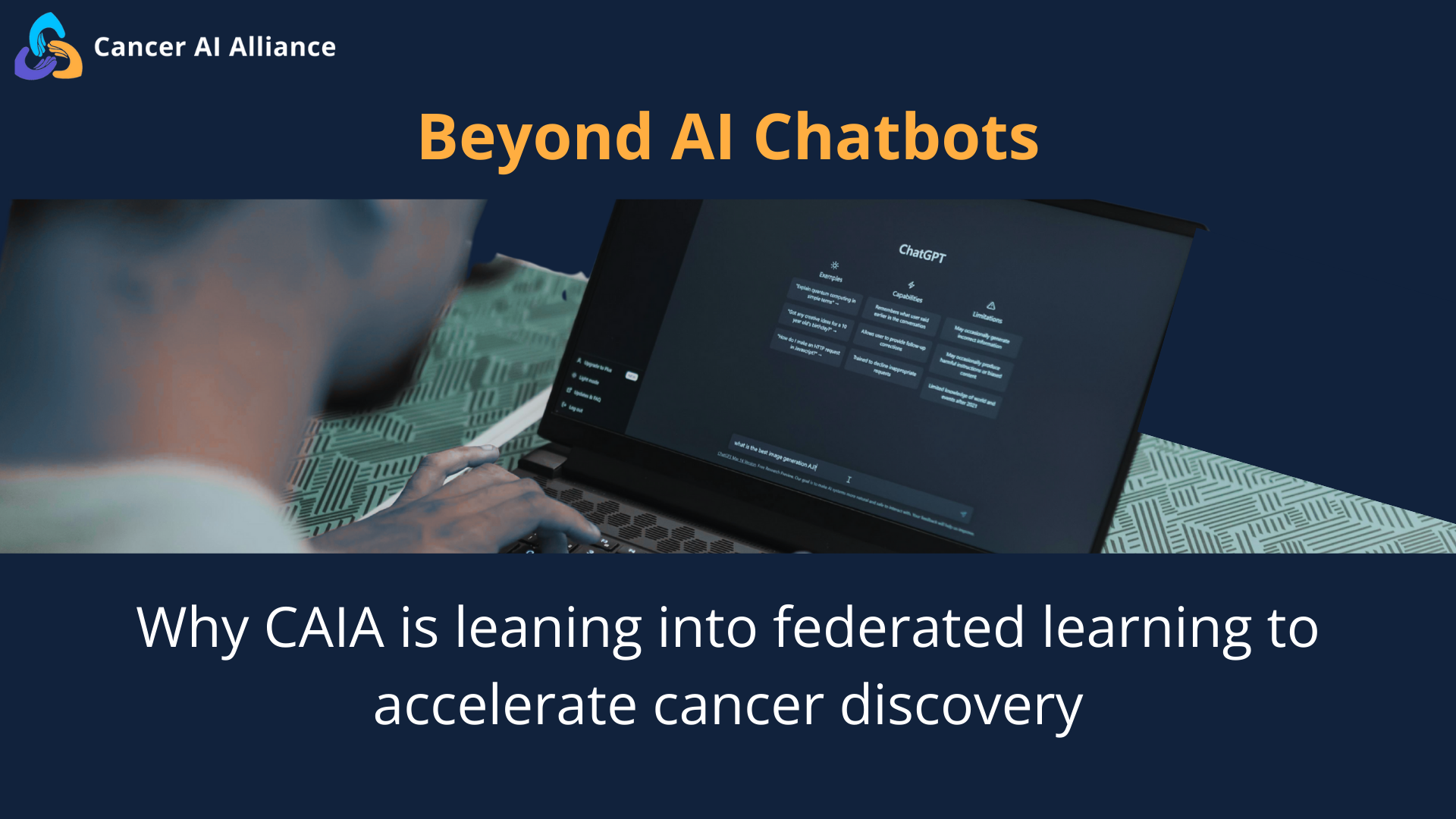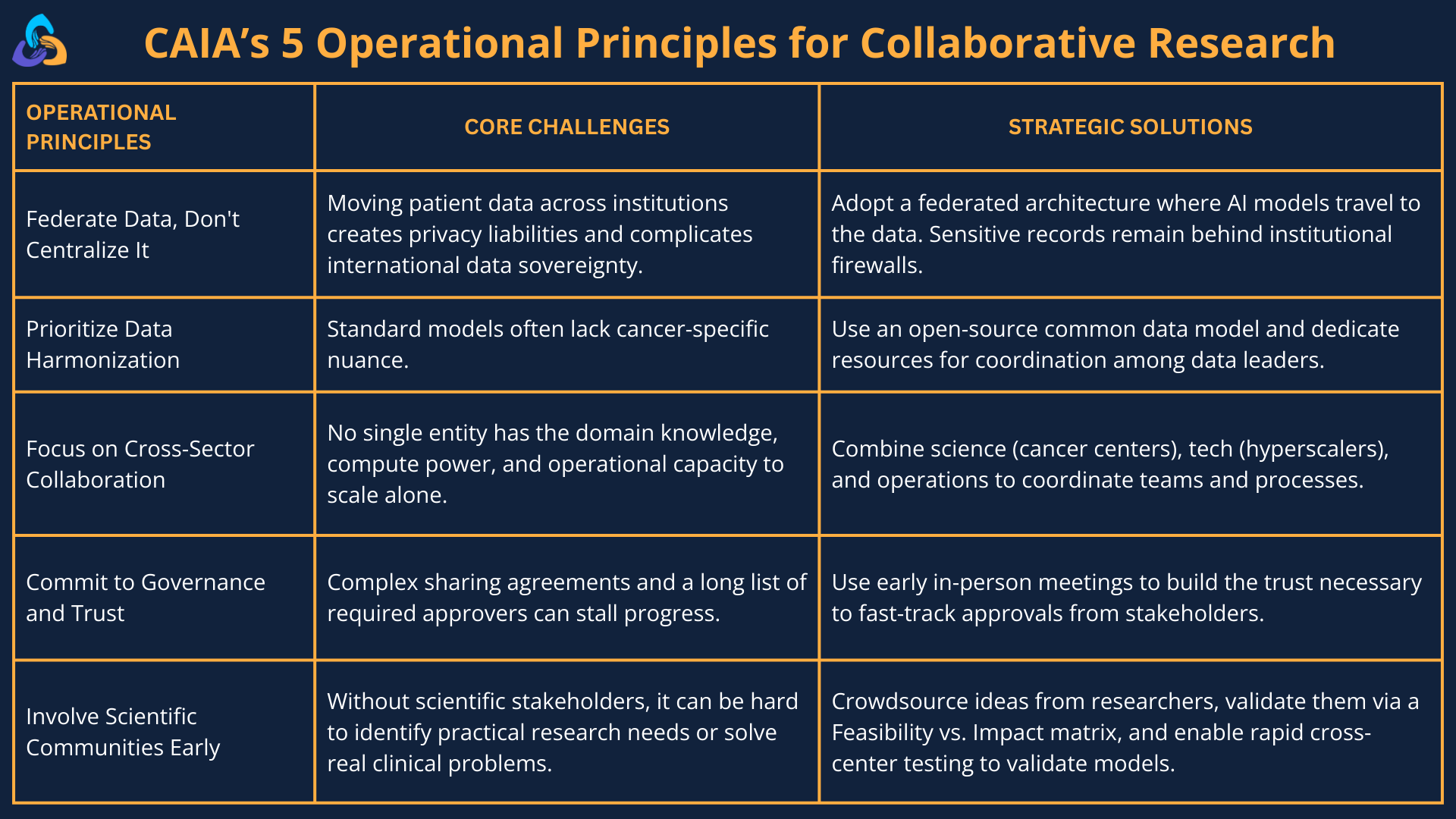Unlocking the Unlimited Potential of AI for Cancer Research
We are bringing together leading experts to tackle the toughest challenges in cancer research. Our goal is to create the world's first AI-driven research platform, accelerating cancer discovery by tenfold with models specifically designed for cancer research.
OUR SUPPORTERS
Leading Comprehensive Cancer Centers have joined forces to form CAIA, with support from AI technology pioneers.
In this 4-minute video, we showcase the breadth of the Cancer AI Alliance by featuring cancer center and technology leaders who are backing CAIA and who support our mission to to more rapidly accelerate cancer research and improve clinical care
CANCER CENTER PARTNERS AND ALLIANCE MEMBERS
PHILANTHROPIC PARTNERS
WHAT WE ARE BUILDING
To connect siloed cancer research projects, the Cancer AI Alliance (CAIA) has launched a groundbreaking platform for seamless collaboration among top researchers.
Leveraging cutting-edge AI, we will enable the rapid analysis of vast de-identified cancer data sets and use a federated AI learning framework to ensure secure, private data analysis while aggregating insights across centers. Committed to the highest regulatory and ethical standards, CAIA is poised to accelerate transformative discoveries that will revolutionize cancer research and care.
An animated overview of CAIA’s federated learning approach
OUR PROGRESS
Together, CAIA is leveraging cutting-edge computing infrastructure and a federated AI learning framework to allow researchers to learn from huge amounts of de-identified cancer data in a secure environment. Our commitment ensures security, privacy, and regulatory compliance, driving forward the future of cancer research. We're not just improving cancer research; we're redefining the entire cancer research landscape. Over the past year, we've secured $65M in philanthropic funding and in-kind support, engaged major cloud computing giants, and partnered with four leading cancer research centers. This effort, spanning the four founding cancer centers, aims to prove the federated learning concept and develop a model for onboarding new members to more rapidly accelerate cancer research and improve patient care.
News and Updates
Frequently Asked Questions
-
The Cancer AI Alliance (CAIA) is a research collaboration of top cancer centers that recently announced the first scalable platform using federated learning for cancer research. The platform serves as the technological foundation of CAIA's aim to save more lives by enabling researchers and clinicians to train AI models that learn from participating cancer centers’ millions of clinical data points while maintaining data security, privacy and adherence to regulatory and ethical standards.
-
CAIA is comprised of National Cancer Institute-designated cancer centers Dana-Farber Cancer Institute, Fred Hutch Cancer Center, Memorial Sloan Kettering Cancer Center, and The Sidney Kimmel Comprehensive Cancer Center and Whiting School of Engineering at Johns Hopkins with financial and technical support from technology industry leaders Amazon Web Services (AWS), Deloitte, Ai2 (Allen Institute for AI), Google, Microsoft, NVIDIA and Slalom.
-
CAIA is a distributed alliance of institutions and individuals. Development of CAIA’s platform was possible due to an intense focus on collaboration and a drive for collective action across the participating cancer centers and technology companies, resulting in a unified technical, legal and governance structure.
-
Federated learning is a machine learning method that preserves anonymity of individual data. The federated learning platform works like this: participating cancer centers implement federated learning technology at their institutions, each connecting to a centralized orchestration component of the platform. Using this architecture, AI models travel to each participating cancer center’s secure data to learn from it locally, generating a summary of its learnings without individual clinical data ever leaving institutional firewalls. The insights gained from training the model on each cancer center’s de-identified data are then aggregated centrally to strengthen the AI models to uncover patterns, maximizing the value of the collective knowledge base.
-
CAIA's federated learning platform works by having AI models travel to each participating cancer center’s secure data to learn from it locally, generating a summary of its learnings without individual clinical data ever leaving institutional firewalls. The insights gained from training the model on each cancer center’s de-identified data are then aggregated centrally.
-
By learning from diverse and representative patient populations across the country, AI models can uncover trends and patterns that may be missed by a single institution. This approach aims to improve health outcomes by revealing insights for a broader group of people, including those with rare cancers, and could lead to better discoveries, treatments, and improved clinical decision support.
-
Eight unique projects are being launched by researchers across the participating cancer centers. These initial projects aim to tackle some of oncology's most persistent challenges, from predicting treatment response to identifying novel biomarkers and analyzing rare cancer trends. The platform's true power, however, lies in its potential to scale up. Over the next year, CAIA plans to enable dozens of research models and add more participants to the alliance.
-
Development of CAIA’s platform was possible due to an intense focus on collaboration and a drive for collective action across the participating cancer centers and technology companies, resulting in a unified technical, legal and governance structure. CAIA represents a strategic shift leveraging collective strength rather than isolation.
-
Over the next year, CAIA plans to enable dozens of research models and add more participants to the alliance. This could serve as a model for every cancer center in the country to join CAIA in this collaborative effort to unlock innovation in cancer care.
For more information, follow us on LinkedIn or X, sign up for our newsletter via our website, or email us at info@canceralliance.ai














